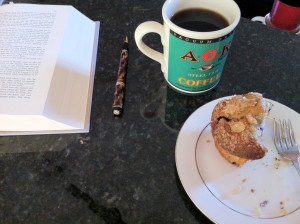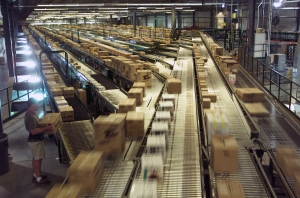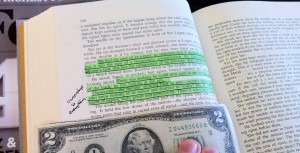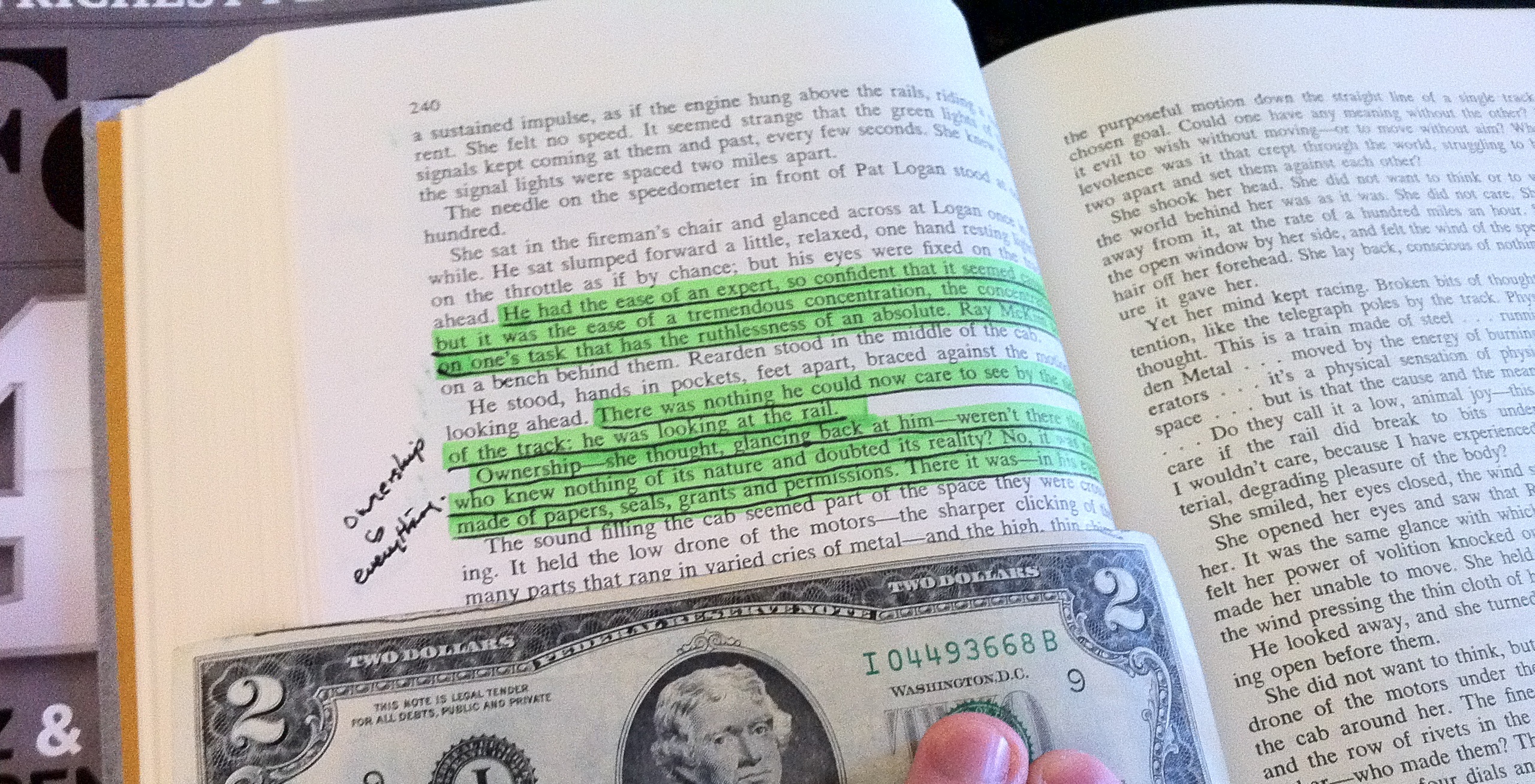 I woke up this morning, wrapped myself in the warmth of the substantial and soft terrycloth Brooks Brothers bathrobe, and went to have breakfast. Instead of the usual, I chose a blueberry muffin topped with brown sugar crumble and a cup of strong black coffee as I started reading Atlas Shrugged immediately, my eyes barely able to focus. As you know, I started reading it two days ago and then I escaped to read some more yesterday at a Perkins near Kansas City before taking a trip to visit my family.
I woke up this morning, wrapped myself in the warmth of the substantial and soft terrycloth Brooks Brothers bathrobe, and went to have breakfast. Instead of the usual, I chose a blueberry muffin topped with brown sugar crumble and a cup of strong black coffee as I started reading Atlas Shrugged immediately, my eyes barely able to focus. As you know, I started reading it two days ago and then I escaped to read some more yesterday at a Perkins near Kansas City before taking a trip to visit my family.
In fact, Atlas Shrugged has become the first thought on my mind in the morning and the last thought before I fall asleep. Or, rather, it is my contemplation of the underlying philosophy of the book. Although I agree much with Rand to the point that it feels, at times, as if my innermost thoughts have been poured onto the paper, I do not agree with 100% of the “objectivism” philosophy Rand espoused and the logical conclusions to which it brought her.
I’m Not Certain that Lassez Faire Capitalism Achieves Total Freedom
For example, I believe heavily in a free market and am a capitalist with a capital “c”. However, I think laissez faire capitalism can collapse in on itself unless it has some very broad guidelines, like the ring surrounding a bumper car ride at an amusement park. In fact, it are those very guidelines and restrictions that make me believe in the moral superiority and beauty of a company like Wal-Mart, which revolutionized our mastery of distribution systems.
Take George Pullman. I think he was one of the most worthless men who ever lived despite his success in business. Why? He built a company town and:
Pullman ruled the town like a feudal baron. He prohibited independent newspapers, public speeches, town meetings or open discussion. His inspectors regularly entered homes to inspect for cleanliness and could terminate leases on ten days notice. The church stood empty since no approved denomination would pay rent and no other congregation was allowed. Private charitable organizations were prohibited.
Clearly, a constitutional guarantee of individual rights is necessary. I realize this was his private property, but there is something severely demented with a man when he attempts to force everyone to live as he wishes, including attempting to limit their freedom of speech. A truly free market means that Pullman would have been renting out property for use to tenants and if they agreed to pay his price, not damage the property, and pay the rent on time, it’s none of his damn business what they do or what they believe.
Do I, as a Christian, have a right to refuse to rent an apartment unit in a building to a Hindu? No! If they pay the rent, they meet the qualifications, and they follow the rules, their personal religious freedoms, guaranteed by the constitution, are (rightfully) beyond my reach. It’s okay to prohibit actions on the clock because you are buying someone’s time in a free exchange. You cannot control them when they walk out the door, though, even if they live in your house. Pullman was a tyrant, just like a government bureaucrat or a communist officer is a tyrant.
It Is the American Framework That Makes Me Love Successful Businesses
The framework we have in place limiting lassez faire capitalism is the same reason, though, that I adore Wal-Mart. It operated within a system of rules that is perfectly fair, in contrast to Pullman.
That is, had Wal-Mart been able to bribe freight companies, such as UPS, to carry its goods only and not pick up goods of other retail store, their victory in the market would have been a flimsy scam no different than robbing someone at gunpoint; totally devoid of any justice or merit.
But because Wal-Mart isn’t able to do that under anti-trust laws, they had to develop their own system, use their own earnings, hire their own people, and figure out how to get cost savings out of the supply chain. They had to design warehouses, figure out how to use less materials to ship, increase the efficiency of the trucks, etc. They did it entirely on their own, by hiring the best people and investing in fixed assets and technology, starting with bringing the now-retired David Glass to the company several decades ago.
Wal-Mart out-thought, out-executed, and out-ran everyone despite starting with enormous disadvantageous and virtually no money. It fills my heart with joy to the brim to see that Walton Enterprises LLC, the firm through which Sam’s family owns their Wal-Mart stock, has a $90+ billion net worth because everyone had (and has) an equal opportunity to beat them. In fact, Target, which was a family department store a century ago, has almost built their distribution system to the same point on some of their goods so that, if they chose, they could compete with Wal-Mart on the retail price of toothpaste and laundry detergent. That was private market capital, raised by issuing stock and bonds to investors, stewarded by managers entrusted with those funds, to generate a profit for taking the risk.

One of the greatest achievements in civilization has been the development of low-cost distribution systems, like those at Wal-Mart Stores, Inc. With almost no humans required to function, it frees mankind's most valuable asset - the human mind - to focus on more important things such as curing cancer or achieving space travel. If, instead, men choose to watch more television and complain about the state of the economy, than that is our own moral failing, not the fault of the distribution center efficiency.
That is why, I say without any measure or hint of anything but total, unabashed admiration, that I think Wal-Mart is an example of all that is right in the world and all that is good about man, even if it does suffer – like all things – from the occasional mistake (e.g., the same way that the American form of a democratically-inspired constitutional republican government has allowed us to prosper despite unfortunate incidents like killing innocent civilians in Vietnam or putting Saddam Hussein in power). An illustration of this would be the proportion of goods imported from China, even though it is a canard that this is responsible for the trade deficit since virtually all of it consists of oil and automobiles, which I explained in How to Solve the Trade Deficit.
It is impossible for me to walk through the doors of a Wal-Mart without thinking about Sam Walton and his life story. When I walk in, it feels almost as if I am entering a temple of a man’s success and the fruit of a lifetime of labor and a dream fulfilled. And, during almost every trip down the aisles, I say a silent prayer to God, thanking Him for being born in a country that can produce a mind and a man like Walton. Almost all of human history lived in pallid squalor, a dreary existence of mere sustenance, eked out from rocky ground and broken spirits. Had Sam been born only 30 years earlier in China, he would have died an unknown boatman or rice farmer; that great mind, wasted.
Using the Government as the Barrel of a Gun
Furthermore, as I’ve said in the past, Wal-Mart has never put someone out of business. Individual consumers walk through the doors and choose to spend their hard-earned money there because Wal-Mart is satisfying a need that some other merchant isn’t. In fact, when Wal-Mart cut a bunch of products from its store shelves a year or so ago, millions of customers just stopped coming in the doors and management quickly reversed course.
When some misguided fools complain about the situation, what they are really saying, whether they realize it or not, is that they don’t like the freedom of choice their fellow man has exercised. They often wish to use the arm of the government, like the barrel of the gun, to correct their neighbors’ “mistakes”. It is the very definition of evil.
 If I want to take cash that I have earned through my own work and exchange it for merchandise owned by another man, the terms we negotiate among ourselves and the price I pay is no one’s damn business because of freedom of choice.
If I want to take cash that I have earned through my own work and exchange it for merchandise owned by another man, the terms we negotiate among ourselves and the price I pay is no one’s damn business because of freedom of choice.
I believe that the most morally perfect world is the one in which men are free to act as they wish to achieve their own desires provided that they don’t cheat, steal, kill, intimidate by use of force, or lie. Even products such as fair trade coffee, which are considerably more expensive but allow the coffee plantation workers a living wage, are a free exchange of goods because what the purchaser is really “buying” is coffee + the feeling of virtue in helping those less fortunate (there are cases of social proof, where people buy socially acceptable products due to peer pressure, in which case they aren’t buying a warm, fuzzy feeling but rather the lack of contempt of their associates).
There is nothing wrong with this. Personally, during college, when fair trade coffee was available everywhere, it was my preference. But I realized that anything I paid above the free market price of coffee was really a purchase that involved a “badge” to symbolize what type of person I was. I was buying a feeling about myself – that I cared about coffee workers – because I really do care that they are paid well and I really am grateful I live in the richest country in history. Some people buy the badge to show off to others.
Don’t be ashamed of it because the coffee workers got a free exchange and received more money. The only evil would be to deny that reality. Self-delusion is not a virtue.
(Full disclosure: During my penny-saving years, I drank Folgers in part because the factory that roasts the beans is located in Kansas City, near where Aaron and I grew up, so I knew the money goes to the workers right over the bridge near Broadway as you enter the downtown area. Now, of course, it is mostly Douwe Egberts coffee.)
It Comes Down To Individual Freedom of Choice … Including the Freedom to Fail or Succeed According to Your Ability, Actions and Decisions
I believe that the greatest and highest ideal of humanity is that a man must be able to choose his own destiny, not be compelled to a course of action by force; that is, one of the great ills in the world is the spirit of a father who insists his son must become a dentist because he comes from a long line of dentists or a government that says a man can’t become a tailor because the nation already has too many tailors, depriving him of the opportunity to take a risk and consumers the freedom of making a choice. Furthermore, man must be allowed to fail. The only thing that makes reward worthwhile is the possibility of failure. Without hell, how would we know the value of heaven?
This moral law is already engraved into the fabric of the very universe. As I’ve said before, I need to lose about 45 pounds because I make bad choices about food, opting at a nice restaurant to spend $200 on a steak with creamed corn side instead of $40 on a grilled chicken salad and unsweetened iced tea. But you know, despite the fact my choices have been sub-optimal, it is exhilarating that I got to make them. Me. My failure is my own! And that is one of the things that makes life worth living. Likewise, my success in business is a result, in part, of my choices.
Even in my own businesses, if I ignore customer phone calls, carry products no one wants, and start squandering precious capital on ridiculous expenses such as gold-plated faucets, it would only be a matter of time before we failed. We would fail. And that is justice because it would be deserved – we were no longer providing society a service or product it wanted at a price it was willing to pay.
As such, it is exciting that Wal-Mart’s success isn’t guaranteed. It is only now as powerful as Sears Roebuck was at the turn of last century! Now, Sears is a second-tier (at best) department store that is a pathetic shadow of its former self. The only hope it has, in my opinion, is becoming a form of a Berkshire Hathaway for Chairman and CEO Eddie Lampert. He’s certainly smart enough to pull it off, given that he has enough time (or as Buffett put it when referring to himself, he is not “hit by a truck”). At some point, Sears stopped serving customers the way it should have and it allowed Wal-Mart to rise. With its skyscraper in Chicago and its footprint of global power, a tiny five-and-dime store in Bentonville, Arkansas blew past them.
That is the story of America.



